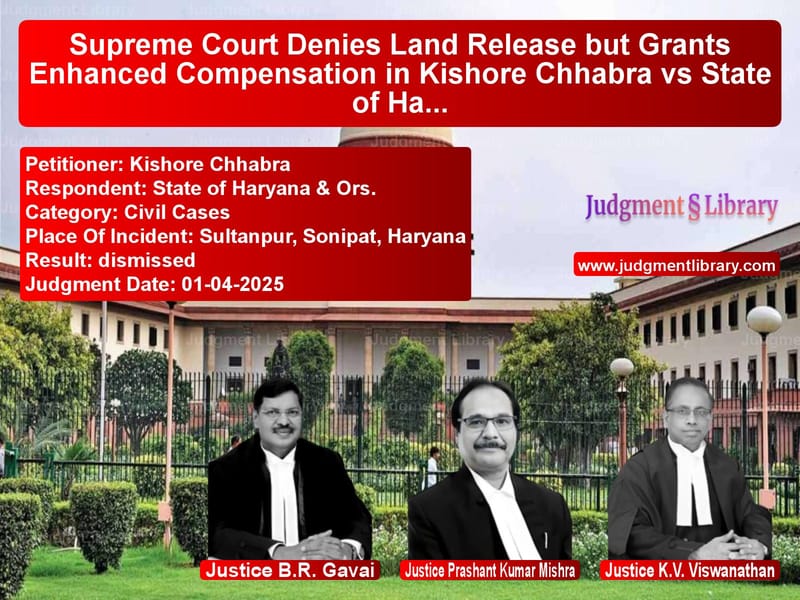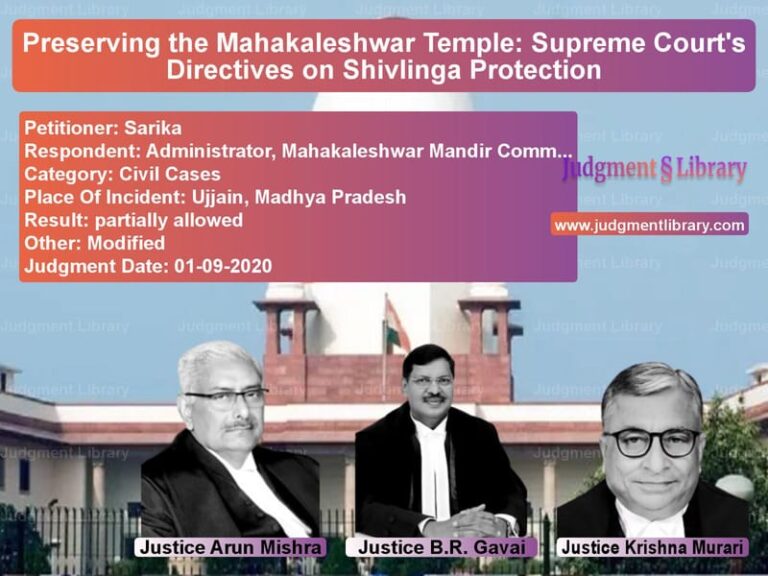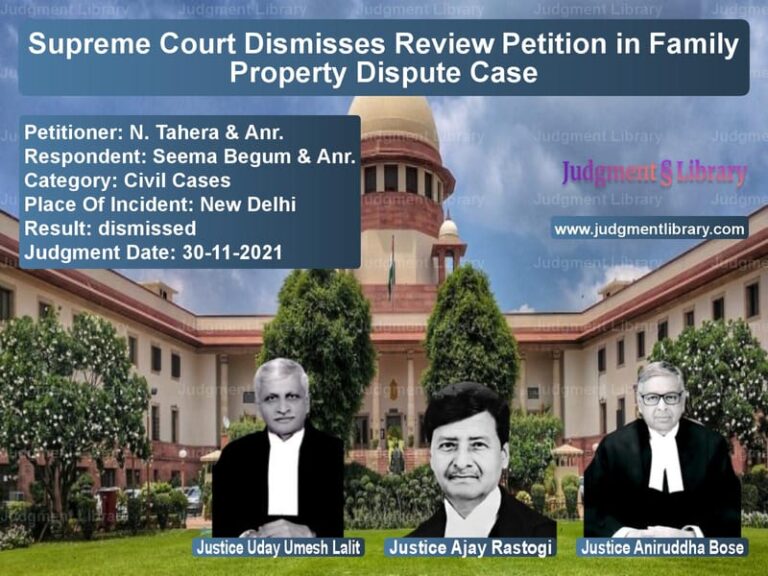Supreme Court Denies Land Release but Grants Enhanced Compensation in Kishore Chhabra vs State of Haryana Case
The Supreme Court of India recently delivered a significant judgment in the case of Kishore Chhabra vs State of Haryana & Ors., addressing issues related to land acquisition and the release of acquired land under the Land Acquisition Act, 1894. The judgment, pronounced on April 1, 2025, by Justices B.R. Gavai, Prashant Kumar Mishra, and K.V. Viswanathan, dismissed the appeal seeking release of the land but directed enhanced compensation under the Right to Fair Compensation and Transparency in Land Acquisition, Rehabilitation and Resettlement Act, 2013. The case revolved around the acquisition of land in Sultanpur, Sonipat, Haryana, and the appellant’s claim for its release based on alleged discrimination and non-compliance with statutory requirements.
Background of the Case
The appellant, Kishore Chhabra, is the owner of land and a constructed area measuring 386 sq. yards and 3078 sq. yards at Sultanpur, Sonipat, Haryana, which he purchased in 1986. On November 9, 1992, the State of Haryana issued a notification under Section 4 of the Land Acquisition Act, 1894, for the acquisition of land for residential and commercial development. The appellant’s land was included in this acquisition, and the Land Acquisition Collector passed an award on November 5, 1995, stating that possession had been taken and the land vested with the government.
The appellant filed multiple writ petitions challenging the acquisition and seeking the release of his land. His first writ petition was dismissed, and the second was withdrawn as his representation was pending. The third writ petition, which is the subject of this appeal, challenged the rejection of his representation dated August 17, 2010, by the State Government. The High Court dismissed the writ petition, leading to the appeal before the Supreme Court.
Key Arguments
Arguments by the Appellant (Kishore Chhabra)
The appellant contended that:
- His land was similarly situated to other lands that had been released by the State Government, and thus, he was being discriminated against.
- He had been running a factory on the land since 1970, which predated the acquisition notification, and his case fell within the State Government’s policy for release of land.
- The rejection of his representation was arbitrary and lacked reasoned justification.
Arguments by the Respondents (State of Haryana)
The respondents argued that:
- The appellant had not filed objections under Section 5-A of the Land Acquisition Act, and his request for release was delayed.
- The appellant did not possess a valid Change of Land Use (CLU) certificate, which was a prerequisite for the release of land under the State’s policies.
- Substantial government expenditure had already been incurred on the development of the acquired land, and releasing the appellant’s land would disrupt the planned development.
Court’s Analysis and Decision
Validity of Change of Land Use (CLU) Certificate
The Supreme Court noted that the appellant’s land fell within a controlled area declared under the Punjab Scheduled Roads & Controlled Areas Restrictions of Unregulated Development Act, 1963, and thus required a CLU certificate for any commercial development. The Court observed:
“It is the specific stand of the respondent/State in its counter affidavit that the appellant has not obtained a CLU to which the appellant has not submitted any rejoinder. It is thus manifest that the requirement for CLU being a statutory mandate, release of land, in the absence of CLU is not permissible.”
Plea of Discrimination
The appellant claimed discrimination, citing the release of lands belonging to others under the same notification. The Court, however, found that the appellant’s case was distinguishable:
“Material on record reveals that the award was passed on 05.11.1995 and Rapat Roznamcha No. 229 dated 15.11.1995 was prepared much later than the order of release dated 08.04.1994 in favour of Devraj Dewan. The said Devraj Dewan submitted his application for CLU and the State Government took a decision on 31.05.1992 to process the matter for grant of CLU and was eventually granted before Section 4 Notification, the appellant cannot claim discrimination vis-à-vis Devraj Dewan.”
Expenditure Incurred by the State
The Court noted that the State had already incurred significant expenditure on the development of the acquired land, including the construction of sector roads, water supply networks, and other public utilities. Releasing the appellant’s land would disrupt this development:
“Sector-3, which is part of the Notification, is commercial sector and the land has been earmarked for public utilities i.e. Fire Station, Petrol Pump, Police Station, Telephone Exchange, Auto Market etc. and even 21 commercial plots of large scale have also been allotted to multiplex developments and are being developed, and one Leisure Vally Park has already been planned. Thus, release of the subject land will affect the entire planning of the land acquired under the Notification.”
Enhanced Compensation
While dismissing the appeal for release of the land, the Court exercised its powers under Article 142 of the Constitution to direct that the appellant be compensated under the 2013 Act, considering his continuous possession of the land and the operational factory:
“However, since the appellant claims to be in continuous physical possession of the land wherein a factory is in operation and the department has not satisfactorily controverted this aspect of the matter, on the special facts of this case, in exercise of our power under Article 142, we deem it appropriate to direct that the compensation payable to the appellant should be calculated under the Right to Fair Compensation and Transparency in Land Acquisition, Rehabilitation and Resettlement Act, 2013 as on the date of commencement of the said Act.”
Conclusion
The Supreme Court’s judgment underscores the importance of complying with statutory requirements like the CLU certificate for the release of acquired land. It also highlights the Court’s willingness to ensure fairness by granting enhanced compensation in exceptional cases, even while upholding the validity of the acquisition process. The decision balances the rights of landowners with the State’s developmental objectives, setting a nuanced precedent for similar cases.
Petitioner Name: Kishore Chhabra.Respondent Name: State of Haryana & Ors..Judgment By: Justice B.R. Gavai, Justice Prashant Kumar Mishra, Justice K.V. Viswanathan.Place Of Incident: Sultanpur, Sonipat, Haryana.Judgment Date: 01-04-2025.
Don’t miss out on the full details! Download the complete judgment in PDF format below and gain valuable insights instantly!
Download Judgment: kishore-chhabra-vs-state-of-haryana-&-o-supreme-court-of-india-judgment-dated-01-04-2025.pdf
Directly Download Judgment: Directly download this Judgment
See all petitions in Property Disputes
See all petitions in Damages and Compensation
See all petitions in Public Interest Litigation
See all petitions in Legal Malpractice
See all petitions in Consumer Rights
See all petitions in Judgment by B R Gavai
See all petitions in Judgment by Prashant Kumar Mishra
See all petitions in Judgment by K.V. Viswanathan
See all petitions in dismissed
See all petitions in supreme court of India judgments April 2025
See all petitions in 2025 judgments
See all posts in Civil Cases Category
See all allowed petitions in Civil Cases Category
See all Dismissed petitions in Civil Cases Category
See all partially allowed petitions in Civil Cases Category







